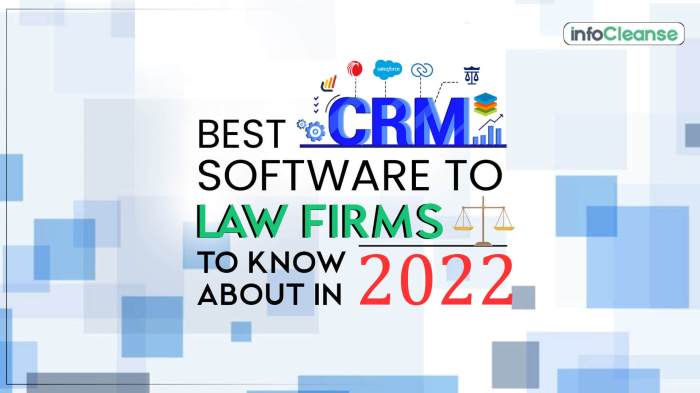Best crm software for law firms – Choosing the right Customer Relationship Management (CRM) software is crucial for law firms of all sizes. A robust CRM system can streamline operations, improve client communication, enhance case management, and ultimately boost profitability. This comprehensive guide explores the best CRM software options specifically designed to meet the unique needs of the legal profession, helping you navigate the complexities of selecting the ideal solution for your firm.
Key Features to Consider in a Law Firm CRM
Before diving into specific software options, let’s identify the essential features a successful law firm CRM should possess. These features go beyond basic contact management and delve into the specific requirements of legal practice.

Source: attorneyatwork.com
Essential Features:, Best crm software for law firms
- Client Relationship Management (CRM): This is the foundation. The CRM should allow for detailed client profiles, including contact information, case history, communication logs, and billing details. Seamless integration with other systems is a plus.
- Matter/Case Management: Effective tracking of cases is vital. The CRM should facilitate the creation, assignment, and monitoring of tasks related to each case, including deadlines, documents, and communication.
- Document Management: Secure storage and easy retrieval of legal documents are paramount. The CRM should integrate with cloud storage solutions and offer robust search functionalities.
- Time Tracking and Billing: Accurate time tracking is crucial for billing clients and managing profitability. The system should allow for easy time entry, expense tracking, and invoice generation.
- Communication Tools: Integrated email, calendar, and potentially even video conferencing features can streamline communication with clients and colleagues.
- Reporting and Analytics: Data-driven insights are key. The CRM should offer customizable reports on key metrics, such as case progress, client satisfaction, and revenue generation.
- Security and Compliance: Protecting sensitive client data is non-negotiable. The CRM should adhere to industry best practices for data security and comply with relevant legal regulations, such as GDPR and HIPAA (if applicable).
- Integration Capabilities: The ability to integrate with existing software (e.g., accounting software, email clients, document management systems) is crucial for efficient workflow.
- Mobile Accessibility: Access to client information and case details on the go is increasingly important. A mobile-friendly CRM allows lawyers to stay connected and responsive.
Top CRM Software Options for Law Firms
The market offers a variety of CRM solutions catering to law firms. Here are some of the leading contenders, categorized for clarity:
Tier 1: Comprehensive & Feature-Rich Solutions
- MyCase: A popular choice, MyCase offers a comprehensive suite of features designed specifically for law firms, including client portals, document management, and integrated billing. It boasts strong security features and excellent customer support. MyCase Website
- Clio Manage: Another industry leader, Clio Manage is known for its user-friendly interface and robust features. It provides excellent case management tools, time tracking, and billing capabilities. It also integrates with many other legal tech tools. Clio Manage Website
- CaseFleet: This CRM is designed to help law firms manage cases, communicate with clients, and track time and expenses effectively. It offers features like automated workflows and robust reporting capabilities. CaseFleet Website
Tier 2: Mid-Sized Firms & Specific Needs
- PracticePanther: A solid option for firms looking for a balance between features and affordability. PracticePanther offers core CRM functionality with strong time tracking and billing features. PracticePanther Website
- CosmoLex: CosmoLex is a comprehensive legal practice management software that includes CRM functionality. It’s a good option for firms that need a more integrated solution for all aspects of their practice. CosmoLex Website
Tier 3: Smaller Firms & Budget-Conscious Options
- Zoho CRM: While not specifically designed for law firms, Zoho CRM’s customization options allow for adaptation to legal workflows. It’s a more affordable option for smaller firms with basic needs. Zoho CRM Website
- HubSpot CRM: Similar to Zoho, HubSpot offers a free CRM option with basic features that can be expanded with paid add-ons. It’s a good starting point for very small firms or those testing the waters of CRM implementation. HubSpot CRM Website
Choosing the Right CRM for Your Law Firm: Best Crm Software For Law Firms
Selecting the best CRM depends on several factors:
- Firm Size: Smaller firms may find simpler, more affordable options sufficient, while larger firms might require more comprehensive solutions.
- Budget: CRM software pricing varies widely. Consider your budget and weigh it against the features offered.
- Specific Needs: Identify your firm’s specific requirements – case management, billing, communication – and choose a CRM that excels in those areas.
- Integration with Existing Systems: Ensure the CRM integrates seamlessly with your current software and hardware.
- Scalability: Choose a CRM that can grow with your firm.
- User-Friendliness: Opt for a system that is intuitive and easy for your staff to learn and use.
Frequently Asked Questions (FAQ)
- Q: What is the average cost of CRM software for law firms? A: Pricing varies significantly, ranging from free options with limited features to thousands of dollars annually for comprehensive solutions. Consider free trials and demos to assess value.
- Q: How long does it take to implement a new CRM? A: Implementation time depends on the complexity of the system and the firm’s size. It can range from a few weeks to several months.
- Q: What are the benefits of using a CRM for a law firm? A: Benefits include improved client communication, streamlined case management, enhanced efficiency, better time tracking and billing, and increased profitability.
- Q: What security measures should I look for in a law firm CRM? A: Look for encryption, access controls, data backups, compliance with relevant regulations (GDPR, HIPAA), and robust security protocols.
- Q: Can I integrate my existing accounting software with a CRM? A: Many CRMs offer integrations with popular accounting software. Check the software’s compatibility before purchasing.
Conclusion
Selecting the right CRM is a significant decision for any law firm. By carefully considering the features, pricing, and your firm’s specific needs, you can find a solution that streamlines operations, enhances client relationships, and ultimately contributes to the success of your practice. Take advantage of free trials and demos to experience the software firsthand before committing to a purchase.
Call to Action
Ready to transform your law firm’s efficiency and client relationships? Explore the options discussed above and choose the CRM that best aligns with your needs. Start your free trial today and experience the difference a dedicated legal CRM can make!

Source: infocleanse.com
Questions Often Asked
What are the key features to look for in a law firm CRM?
Key features include secure client data storage, case management tools, conflict-of-interest checking, document management integration, time tracking capabilities, reporting and analytics dashboards, and seamless communication tools.

Source: vipecloud.com
How much does CRM software for law firms typically cost?
Pricing varies greatly depending on the features, number of users, and vendor. Expect to find options ranging from affordable monthly subscriptions to more expensive enterprise-level solutions. It’s crucial to request quotes from multiple vendors to compare.
Is my data secure in a law firm CRM?
Reputable CRM providers prioritize data security. Look for systems with robust security measures, including encryption, access controls, and compliance with relevant regulations like HIPAA or GDPR. Always review a vendor’s security policies before making a decision.
Can a CRM integrate with my existing legal software?
Many CRMs offer integrations with other legal technologies. It’s essential to verify compatibility with your current systems before choosing a CRM to ensure seamless data flow and avoid potential disruptions.
